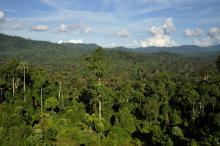Managed relocation has become a much-discussed—and controversial—strategy to help species survive changes in their local habitat by moving them to new areas. That could involve moving animals threatened by human encroachment to new ranges, or moving fish trapped in dying lakes to new waters.
The drawback of course, is the potential for the relocated species to harm the receiving ecosystem and endanger more species and biodiversity.
Now an international team of researchers—including UBC conservation biologist Mark Vellend—have weighed in by developing a tool that will help scientists determine whether moving a species would work. In large part, the working group was prompted by the frightening pace of climate change.
"This isn’t about advocating managed relocation," says Vellend, an assistant professor with Botany and Zoology and Canada Research Chair in Conservation Biology. "It's really about developing a framework for the process, a systematic approach that conservationists can use for making decisions in difficult times."
The new tool—details of which were published early this month in the Proceedings of the National Academy of Sciences—outlines criteria that help experts weigh the benefits of managed relocation compared to other conservation strategies.
Factors like cost, regulatory barriers, chances of success, the likely impact on the receiving ecosystem, the quality of available ecological information and data, and risks involved in not acting, are all incorporated into the framework.
The framework was pieced together in August 2008 by a working group that involved some of the world’s leading ecologists, conservation biologists, climate scientists, legal scholars, ethicists, and governmental and non-governmental organizations.
"The pace of modern climate change demands decision making with imperfect information, and tools that elucidate this uncertainty and integrate scientific information and social values are urgently needed," note the authors.
"Our next major goal is to produce a longer, more comprehensive document outlining the ecological, evolutionary, legal and ethical issues that impinge on the evaluation of managed relocation as a conservation tool," notes Vellend.
Partially funded by the National Science Foundation, the working group is co-led by Jessica Hellmann and Jason McLachlan of the University of Notre Dame, Dov Sax of Brown University, and Mark Schwartz of the University of California, Davis.
Musqueam First Nation land acknowledegement
We honour xwməθkwəy̓ əm (Musqueam) on whose ancestral, unceded territory UBC Vancouver is situated. UBC Science is committed to building meaningful relationships with Indigenous peoples so we can advance Reconciliation and ensure traditional ways of knowing enrich our teaching and research.
Learn more: Musqueam First Nation
Faculty of Science
Office of the Dean, Earth Sciences Building2178–2207 Main Mall
Vancouver, BC Canada
V6T 1Z4


